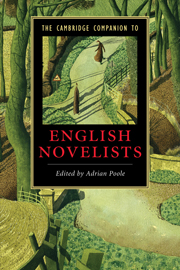Book contents
- Frontmatter
- Introduction
- 1 Daniel Defoe
- 2 Samuel Richardson
- 3 Henry Fielding
- 4 Laurence Sterne
- 5 Frances Burney
- 6 Jane Austen
- 7 Walter Scott
- 8 Charles Dickens
- 9 William Makepeace Thackeray
- 10 Charlotte Brontë
- 11 Emily Brontë
- 12 Elizabeth Gaskell
- 13 Anthony Trollope
- 14 George Eliot
- 15 Thomas Hardy
- 16 Robert Louis Stevenson
- 17 Henry James
- 18 Joseph Conrad
- 19 D. H. Lawrence
- 20 James Joyce
- 21 E. M. Forster
- 22 Virginia Woolf
- 23 Elizabeth Bowen
- 24 Henry Green
- 25 Evelyn Waugh
- 26 Graham Greene
- 27 William Golding
- Guide to further reading
- Index
8 - Charles Dickens
Published online by Cambridge University Press: 28 March 2010
- Frontmatter
- Introduction
- 1 Daniel Defoe
- 2 Samuel Richardson
- 3 Henry Fielding
- 4 Laurence Sterne
- 5 Frances Burney
- 6 Jane Austen
- 7 Walter Scott
- 8 Charles Dickens
- 9 William Makepeace Thackeray
- 10 Charlotte Brontë
- 11 Emily Brontë
- 12 Elizabeth Gaskell
- 13 Anthony Trollope
- 14 George Eliot
- 15 Thomas Hardy
- 16 Robert Louis Stevenson
- 17 Henry James
- 18 Joseph Conrad
- 19 D. H. Lawrence
- 20 James Joyce
- 21 E. M. Forster
- 22 Virginia Woolf
- 23 Elizabeth Bowen
- 24 Henry Green
- 25 Evelyn Waugh
- 26 Graham Greene
- 27 William Golding
- Guide to further reading
- Index
Summary
“They used to say I was an odd child, and I suppose I was. I am an odd man, perhaps.” 'Gone Astray', Household Words, 13 August 1853 / Ever since John Forster published Dickens's autobiographical fragment in his Life of Charles Dickens, readers have known about the main events that marked Dickens's childhood and continued to trouble him as an adult: his father's arrest for bankruptcy and time in the Marshalsea prison; the period he spent working as a 'poor little drudge' in Warren's blacking warehouse; and his loneliness as he wandered the streets of London, slowly sinking into the dirt and misery of those other poor drudges living on the edges of recognition, never more than a few shillings away from his 'vagabond existence' hardening into a permanent way of life. “The deep remembrance of the sense I had of being utterly neglected and hopeless; of the shame I felt in my position; of the misery it was to my young heart to believe that, day by day, what I had learned, and thought, and delighted in, and raised my fancy and emulation up by, was passing from me, never to be brought back any more; cannot be written.” But it could be rewritten. Throughout his career, the figure of an innocent child lost in the city is one that Dickens returns to like someone touching a bruise, at once drawing him back and driving him on. In 'Gone Astray', for example, an essay first published in Household Words in 1853, he explains how, as 'a very small boy indeed, both in years and stature, I got lost one day in the City of London', and as the essay develops, what starts off as a sliver of autobiography quickly takes on the resonance of a founding myth.
- Type
- Chapter
- Information
- The Cambridge Companion to English Novelists , pp. 132 - 148Publisher: Cambridge University PressPrint publication year: 2009

